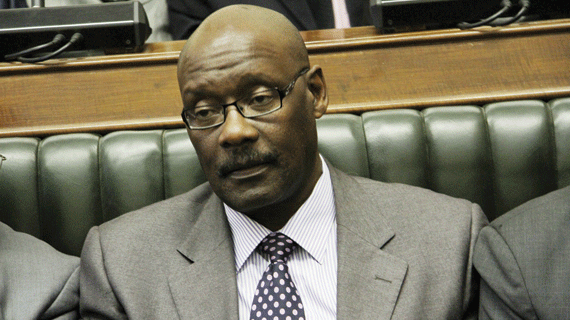
HEALTH and Child Care minister David Parirenyatwa yesterday came face-to-face with the acute shortage of key equipment at Mpilo Central Hospital when officials battled to attend to a patient in the intensive care unit.
CHIEF REPORTER
A female patient, said to be on anti-retroviral treatment, was admitted early yesterday morning and crucial tests were conducted, but there was no free ventilator.
Parirenyatwa, who was taken on tour of the hospital, looked worried at the plight of the patient and ordered hospital staff to find a ventilator for the woman. Officials told the minister that the patient’s condition was fast deteriorating.
The minister was at Mpilo attending a donor conference to raise funds for the rehabilitation of the health institution that is struggling to provide sound health delivery services to thousands of patients.
Parirenyatwa told the conference that the government was committed to resuscitating Mpilo and Parirenyatwa Hospital in Harare, but funding was a stumbling block.
“We have agreed as the government to build new hospitals at the same premises at Mpilo and Parirenyatwa, but not destroying the existing ones. But that’s a long-term project,” he said.
Parirenyatwa said although Bulawayo’s industrial base was crumbling, its industrial hub status could be restored through setting up pharmaceutical manufacturing industries.
- Chamisa under fire over US$120K donation
- Mavhunga puts DeMbare into Chibuku quarterfinals
- Pension funds bet on Cabora Bassa oilfields
- Councils defy govt fire tender directive
Keep Reading
“Mpilo Hospital stands to benefit from a vast potential of medicine tourism. Pharmaceutical companies should establish partnerships with foreign firms and take advantage of the industrial infrastructure.
Bulawayo is an ideal place for medicine tourism,” he said.
During the tour, hospital officials said equipment procured from China was lying idle as staff were struggling to use it since it was labelled in Chinese which they did not understand.
“It’s true that we have equipment shortages and that is compounded by Chinese’s equipment that is lying idle.
“We are battling to understand the language on the manuals,” said an official.
The government sourced the equipment for Mpilo and other health centres through a $100 million loan facility.
Parirenyatwa and potential donors were shown dilapidated theatres, student nurse hostels and other wards.
Mpilo Hospital chief executive officer Lawrence Mantiziba said patients owed the institution $15 million while the government also owed millions.
“The government, due to financial constraints, has missed the target of the 15% 2001 Abuja Declaration on national budgets that should go towards the health sector,” he said.
“Consequently, Mpilo Hospital, as is the case with inadequacies in funds disbursed by the government of Zimbabwe which have not covered yearly approved budgets from 2009 to date, has an accumulated deficit of $3 655 000.
“Furthermore, there is an accumulated maternity fees reimbursement of $2 880 000 from 2012.”
Mantiziba added that Mpilo had an accumulated debt of $2 975 000 to its major suppliers and service providers, resulting in some suppliers terminating credit facilities.
Several companies and individuals made pledges to the hospital. Bulawayo businessman David Ncube, a renal patient, said he had procured three dialysis machines for the hospital from the United States and two were already being shipped to the country.
“I have been a renal patient for the past three years and have been travelling to Harare twice weekly for dialysis,” he said.
“I have, though Pure Treatment Investments, procured three machines. Two are on their way here.” Ncube said that would benefit patients from Bulawayo and the region.
“It is going to obviously provide this clearly lifesaving service to the people of Bulawayo and surroundings making it unnecessary to have to bustle our stricken and fragile bodies,” he said.
“As much as this will save the receiving patients financially, it will also afford them that other precious resource in life, time to spend on a more normal life and spend it with their families.”
Parirenyatwa commended Ncube’s efforts saying he was an exemplary patient.










